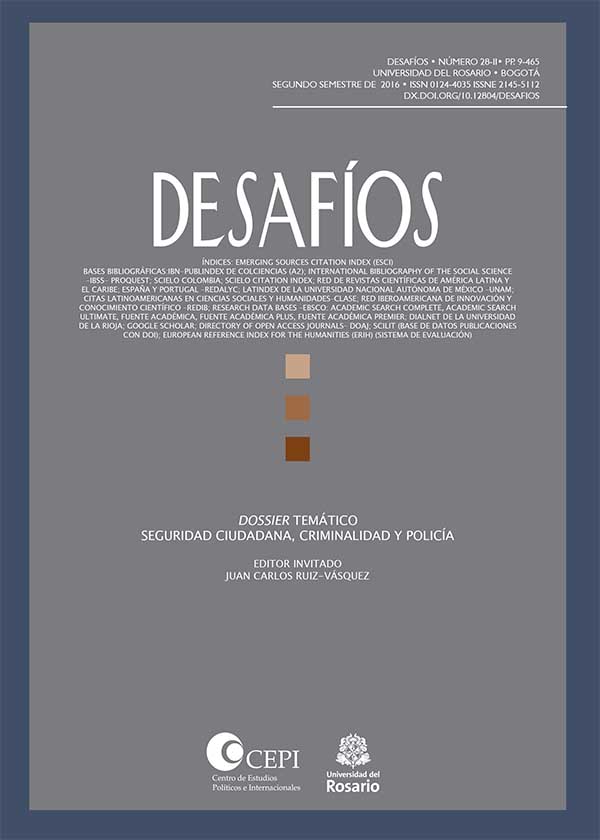La Red de Criminalidad: El Estado y las Políticas de Seguridad en América
Barra lateral del artículo
Contenido principal del artículo
¿Por qué fracasan muchas políticas criminales en las democracias latinoamericanas? Este artículo muestra que es difícil de desarraigar la criminalidad porque es un elemento al centro del desarrollo del estado y el régimen democrático. Específicamente, es parte de las tres redes principales de los proveedores de seguridad: el poder ejecutivo; el sistema de justicia criminal; y la red de grupos armos no estatales. Las relaciones dentro de y entre estas redes reflejan sus intereses y poderes en vez de la seguridad pública, entorpeciendo las políticas de seguridad desde el principio. Se aplica este aná- lisis en dos áreas principales de seguridad pública. Uno es contra un bien (como las drogas) que una fuente de actividad ilegal; su caso de estudio es el tráfico de armas de fuego. Otra dimensión es la rama de políticas de seguridad nacional, desde la mano dura hasta la policía comunitaria. El caso del estudio es Honduras, un país que ha sufrido de todos los problemas de seguridad – con políticas de seguridad que han fracasado por 15 años, antes de que se cambiara su foco en las redes de criminalidad.
Descargas
Abedinsky, H. (2010). Organized Crime. Belmont, CA: Wadsworth.
Amar, P. (February, 2011). Mubarak’s Phantom Presidency, Al-Jazeera English.
Arce, A. (May, 2013). Honduran police accused as death squads. Associated Press.
Associated Press. (June, 2016). 23 Arrested in Guatemala Campaign Finance Case. Associated Press.
Baker, W., & Faulkner, R. (2009). Social capital, double embeddedness, and mechanism of stability and change. American Behavioral Scientist 52(11), 1531-1555.
Boivin, R. (2014). Drug Trafficking Networks in the World Economy. In Morselli, C. (Ed.). Crime and Networks. New York: Routledge.
Boot, W. (October, 2012). Burma’s Fastest Growing Business: Drugs. New York Times.
Comisión Internacional Contra la Impunidad en Guatemala (CICIG). (2012). The Judges of Impunity. Guatemala: CICIG.
Dammert, L. (October, 2005). “Mano inteligente contra la delincuencia”. El Mercurio.
Davis, D. (2003). Law Enforcement in Mexico City: Not yet Under Control. NACLA Report on the Americas, 37(2), 17-24.
Gounev, P. & Bezlov, T. (2010). Examining the Links between Organised Crime and Corruption. Sofia, Bulgaria: Center for the Study of Democracy.
Hagan, F. (2010). Crime Types and Criminals. Thousand Oaks, CA: Sage.
Huhn, S. (2012). Criminalidad y Discurso en Costa Rica: Reflexiones Críticas sobre un Problema Social. San José: Flacso.
Kadushin, C. (2012). Understanding Social Networks: Theories, Concepts, and Findings. New York: Oxford University Press.
Kessler, G. (2004). Sociología del Delito Amateur. Buenos Aires: Paidos.
La Prensa. (November, 2010). Honduras: Facussé acusa a Ham por los asesinatos. La Prensa.
Linz, J. & Stepan, A. (1996). Problems of Democratic Transition and Consolidation: Southern Europe, South America, and Post-Communist Europe. Baltimore: Johns Hopkins University Press.
Mainwaring, S. & Pérez-Liñan, A. (2014). Democracies and Dictatorships in Latin America. Cambridge: Cambridge University Press.
Maltz, M. (1976). On Defining ‘Organized Crime’: The Development of a Definition and a Typology. Crime and Delinquency 22, 338-346.
McSweeney, K., Nielsen, E., Taylor, M., Wrathall, D., Pearson, Z., Wang, O. & Plumb, S. (2014). Drug Policy as Conservation Policy: NarcoDeforestation. Science 31, 343(6170): 489-490.
Miller, T. (January, 2010). Mexico: Corporate Hit Men Find New Ways to Turn Profit. NACLA Reports on the Americas.
Moncada, E. (2016). Cities, Business and the Politics of Urban Violence in Latin America. Stanford: Stanford University Press.
Morçol, G. (2012). A Complexity Theory for Public Policy. New York: Routledge.
Moore, B. (1993). Social Origins of Dictatorship and Democracy. Boston: Beacon Press.
Naím, M. (2012). Mafia States: Organized Crime Takes Office. Foreign Affairs 91(3), 38 – 42
O’Donnell, G. (1993). “On the State, Democratization, and some Conceptual Problems” Notre Dame: The Helen Kellogg Institute for International Studies, Working Paper 192.
Ostrom, E. (1975). On Righteousness, Evidence, and Reform: The Police Story. Urban Affairs Review 10(4), 464-486.
Oxhorn, P., Tulchin, J. & Selee, A. (2004). Decentralization, Democratic Governance, and Civil Society in Comparative Perspective: Africa, Asia, and Latin America. Washington, DC: Woodrow Wilson Center Press.
Paoli, L. (2004). The Illegal drugs market. Journal of Modern Italian Studies 9(2), 186.
Papachristos, A. & Smith, C. (2014). The Embedded and Multiplex Nature of Al Capone. In Morselli, C. (Ed.). Crime and Networks. New York: Routledge.
Policía Nacional de Ecuador. (2006). Saludo a cargo del señor comandante general. Quito: Policía Nacional de Ecuador.
Radio HM.hn. (2014). “Más de 400 empresas de seguridad privada operan ilegalmente en Honduras”. Retrieved from http://www.sgumava.info.seguridad_riva_en_america_lainta.html
Ramsey, G. (2012). “Honduras Tycoon Accused of Drug Ties Names” Press Predator, InSight Crime, Retrieved from www.insightcrime.org
Sabet, D. (2012). Police Reform in Mexico. Stanford: Stanford University Press.
Schedler, A., Diamond, L., & Plattner, M. (Eds.). (1999). The Self-Restraining State. Boulder. CO: Lynne Rienner Publishers.
Schmitter, P. & Karl, T. (1991). What Democracy Is … And Is Not. Journal of Democracy, 2(3), 75- 88.
Sheptycki, J. (2003). Global law enforcement as a protection racket. In Edwards, A., & Gill, P. (Eds.) Transnational Organised Crime. London: Routledge.
Smith, D. C. (1980). Paragons, pariahs, and pirates: A spectrum-based theory of Enterprise. Crime and Delinquency. 26(3), 358-386.
Tilly, C. (1985). State Formation as Organized Crime. In P. Evans, D. Rueschemeyer, & T. Skocpol. (Eds.). Bringing the State Back In. Cambridge: Cambridge University Press.
Thomson, J. E. (1994). Mercenaries, Pirates, and Sovereigns. Princeton, NJ: Princeton University Press.
Waller, J. M. (2004). Organized Crime and the Russian State. Demokratizatsiya 2(3), 364–83.
Wolf, S.(2012). El Nexo entre las Maras y el crimen Organizado. In H. Mathieu & C. Niño Guarnizo (Eds.). Anuario 2012: de la Seguridad Regional en América Latina y el Caribe. Bogotá: Friedrich Ebert Stifting.
Zhang, S. (2014). Snakeheads and the Cartwheel Network. In C. Morselli (Ed.). Crime and Networks. New York: Routledge.



